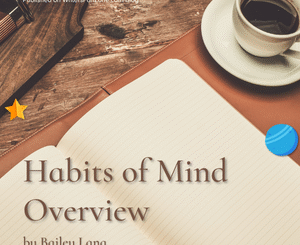Life Has Been Created! by Catharine Bramkamp
 Let’s welcome back monthly columnist Catharine Bramkamp as she shares with us about how “Life Has Been Created!” Enjoy!
Let’s welcome back monthly columnist Catharine Bramkamp as she shares with us about how “Life Has Been Created!” Enjoy!
***
I am fascinated by the passive sentence.
Passive sentences gained popularity in the mid-18th century with new scientific research. The agreement between the scientists and the publishers of journals and newspapers was that the scientist (a new term and a new field of study) were to write up their ideas and findings passively. They were to allow the facts (as they were) to speak for themselves, removing any action or conjecture on the part of the publishing scientist, or in the early years, the talented amateur. Instead of writing, “I boiled the water and it turned into steam (one of the few guaranteed science experiments I’m comfortable quoting),” the scientific syntax would read, “The water was boiled,and apparently turned to steam.” No scientist, no direct action. The water was boiled.
This is understandable on the face of it. Reading a science journal peppered with “I did this, then I did that,” would be boring and lead to accusations of self-aggrandizement. But the scientific method of writing, just like the scientific method, as well as how to write about it, expanded to include law and academics, like so much apparent steam. It wasn’t long before law journals, police records and finally, history books were all written using the scientific method.
This is why the aforementioned collections are so damn boring: no one does anything.
Passive sentences lodged into political debate as well.
George Orwell, (too bad he couldn’t be a guest on our podcast), was really worked up about language and politics and the mis-use therein, so much so he wrote 1984 and created a political and controlling language, double speak, to make his point: remove the action, remove the I, and it will affect your very thoughts.
Does anyone write in the active voice?
Yes. Novelists and journalists do. Journalism is all about the direct, one true sentence. A journalist wrote about action, about immediacy — if you are running with the bulls, run. Don’t watch them pass by.
The active worked in journalism until it didn’t.
Consider the difference between the headline: Bob Dillion robs Risky Derivative Bank or Risky Derivative Bank was Robbed.
For years those true, active sentences ended up creating folk hero and martyrs, and the press learned (actively).
In as many cases as is appropriate, the new journalism strives to eliminate the evil perpetrator, the criminal, the shooter.
The victims are listed at the top of the story and described in entirely passive sentences: they were shot, they were hurt. The bank was robbed.
We took out the actor, the action, and are left with the results: mistakes were made.
What does this trend mean for writers?
Passive is as manipulative as the term passive aggressive indicates. We can push what we consider unimportant off the page, out of the conversation. We can pull what we consider the important to the first line in the sentence using the passive voice.
We can bend opinion and focus just by altering the syntax of our sentences.
Passive sentences can absolve a person of all guilt. You can headline as the bank robber, or you can disappear with the loot, like so much steam.
Excerpt from the forthcoming book, Don’t Write Like We Talk: What we learned after four years interviewing authors and agents, publishers and poets by Damien Boath & Catharine Bramkamp.
***
ABOUT THE AUTHOR
Catharine Bramkamp is the co-producer of Newbie Writers Podcast that focuses on newer writers and their concerns. She is a successful writing coach, Chief Storytelling Officer, and author of a dozen books including the Real Estate Diva Mysteries series, and The Future Girls series. She holds two degrees in English, and is an adjunct university professor. After fracturing her wrist, she has figured out there is very little she is able to do with one hand tied behind her back.







